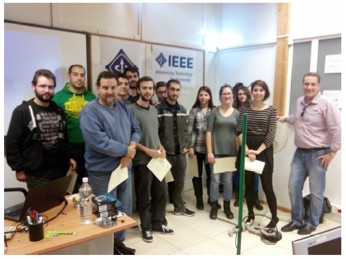
IEEE CASS 2nd Call for Outreach Initiatives 2015
The 2nd Call for Proposals of the CASS Outreach Initiative 2015 is open for all members, Chapters, or Committees to seek funding to support events/activities to be completed by the end of December 2015 (please note funding cannot be transferred to next year if unspent). Please use the online form available here to submit all required information: http://ieee-cas.org/2nd-call-for-proposals-outreach-initiative-2015.
Examples of activities and events funded in previous Outreach calls can be found here: http://ieee-cas.org/about/financial-activities.
All proposals must be received by no later than 30 April 2015. All proposals will then be evaluated and ranked by the BoG Financial Activities division and funding will be allocated accordingly.
Please notice that we cannot support research proposals or acquisition of equipment or hiring of support staff.
Also, please note that if the proposal is funded, the funds must be sent to an IEEE Entity (Section, Chapter, etc.) bank account. Funds cannot be sent directly to individuals per IEEE restrictions. Also, a one page leaflet (call for Papers style) promoting the event will be due at least 3 weeks in advance of the Outreach event for distribution to the CAS members. Moreover, we ask you to write immediately after the event a mini article (journalist style, one page or so) that describes the event, gives information on the participation and briefly indicates the technical aims. Color pictures or video (good quality) are recommended.
For further information or any questions feel free to contact me, the VP-Financial Activities, Eduard Alarcon at eduard.alarcon@upc.edu or the CAS Administrator, Erin Bise at manager@ieee-cas.org.
Best regards,
Eduard Alarcon
VP Financial Activities
IEEE Circuits and Systems Society

Edgar Sánchez-Sinencio honored as University Distinguished Professor by Texas A&M University
Congratulations to Edgar Sánchez-Sinencio, who has recently been named as University Distinguished Professor by Texas A&M University. The title, which is bestowed in perpetuity, is among the highest honors awarded to Texas A&M faculty members. Details: http://today.tamu.edu/2015/04/02/five-texas-am-faculty-honored-as-university-distinguished-professors-2/
SOCIETY NEWS
CASS Outreach Initiatives: Multi-Modal Learning Course on Digital Systems Design Using VHDL & FPGAs

On December 15 2014, the final examination was held for the 1st multi-modal learning course on digital systems design using VHDL & FPGAs, at the premises of the Digital Systems and Media Computing laboratory (dsmc2.eap.gr) of the Hellenic Open University (HOU) in Patras, Greece. The 5-week course was held under the sponsorship of an IEEE Circuits and Systems Society grant, while ALTERA donated the development boards. Apart from tutoring, the course included demonstrations and workshops on digital system design using VHDL and FPGA boards on a remote laboratory facility, as well as a visit to a microelectronics business incubator. The workshop was implemented on a blended learning basis: it consisted of lectures and laboratory exercises carried out at a distance, according to the standard tutoring practice of HOU. The lectures were delivered via the Centra Symposioum virtual classroom infrastructure and the laboratory exercises were carried out remotely. Students were registering to a website and then connected to one of the installed systems. Code was written, compiled locally using the VHDL design suite provided by ALTERA and uploaded through the web interface supporting interaction with the lab infrastructure and results of running the code in the real systems were
visualized by means of a web camera. The systems were up and running 24/7.
The aim of the workshop was to introduce participants to digital design using VHDL and to allow them to practice by using state of the art EDA tools (Altera Quartus, Modelsim) and accessing a fully functional remote lab that includes FPGA boards and pre-connected peripheral hardware. Students were able to experiment with existing hardware and design their own digital systems using the ALTERA DE0-nano board, several, sensors, servo motors, displays and LEDs. The range of exercises covered the full series of exercises that a student in a conventional onsite lab has to experiment with during a typical university term. Four virtual lectures (1 per week) were delivered, while students sat a final laboratory examination at DSMC premises, in Patras, where an attendance certificate, was issued to all students who fulfilled all requirements. We hope that we will manage to offer the follow up course soon, however until then, one may practice with the system installed on 194.24.226.111 since our intention is to leave this freely accessible for the engineering community.
Fanis Orphanoudakis, Hellenic Open University (Email: fanis@eap.gr)

